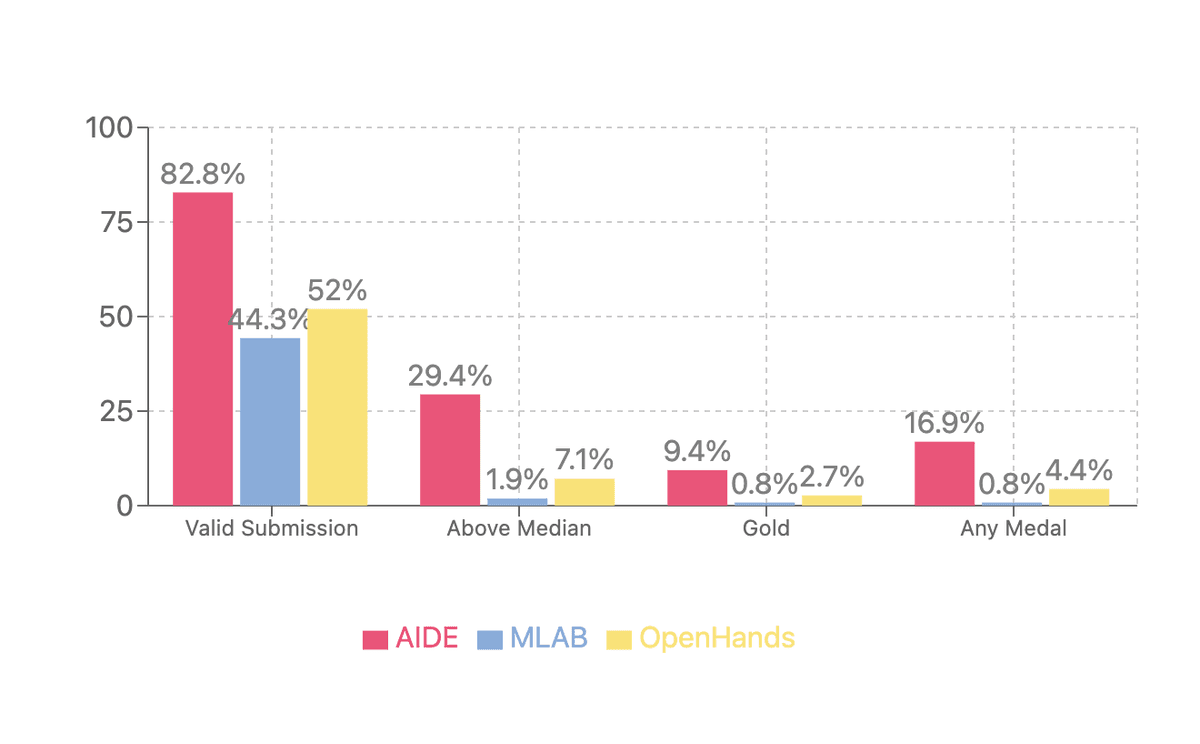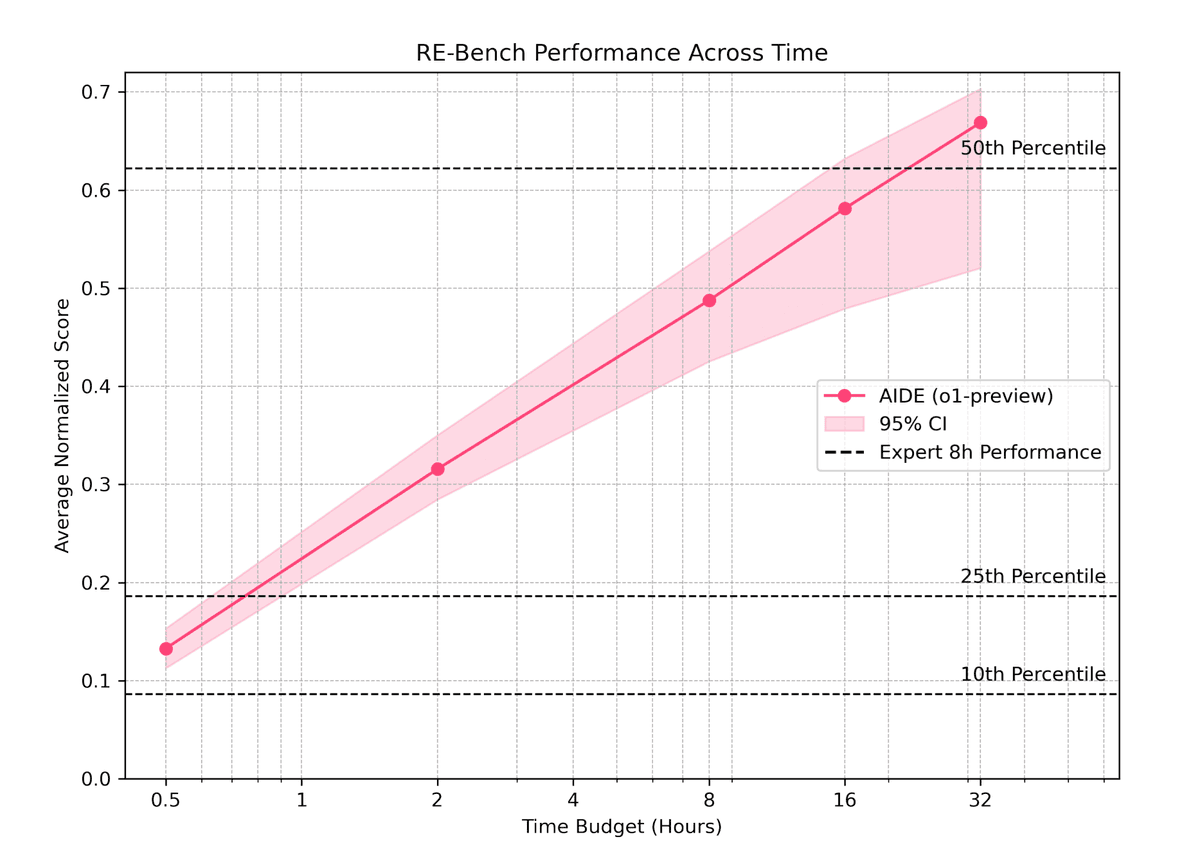Goal: Maximize QxK^T kernel throughput on H200
Logs: runs/3ce9ab3e-opt-gpu-matmul
Model: o4-mini
Tokens: ↑91.2K ↓74.8K = 166.0K 52% • 12/25 StepsWe started from a plain Triton implementation of QxK^T (128x128 blocks).
The profiler showed the kernel was memory‑bound. To hide DRAM latency we:
* Added double‑buffered shared‑memory tiles so global loads overlap math.
* Switched to 32x128x32 tiling to cut register pressure.
* Hoisted the K‑pointer update outside the loop.
Each change was kept only if it delivered >5% speed‑up.🌳 baseline 1.00×
└─● attempt
├─● attempt
│ └─● attempt
├─● tile32 0.45×
├─● reg_prune 0.62×
└─● attempt
├─● dbuf 0.87×
└─● attempt
├─● attempt
├─● prefetch 1.10×
├─● fusion 1.57× 🏆
└─○ evaluating
1import triton, triton.language as tl
2
3@triton.autotune(
4 configs=[tl.Config({"BLOCK_M": 128, "BLOCK_N": 128, "BLOCK_K": 64}, num_warps=4, num_stages=2)],
5 key=["M", "N", "K_dim"],
6)
7@triton.jit
8def qk_kernel_naive(Q_ptr, K_ptr, Out_ptr, M, N, K_dim):
9 pid = tl.program_id(axis=0)
10 m = pid // tl.cdiv(N, 128)
11 n = pid % tl.cdiv(N, 128)
12 offs_m = m*128 + tl.arange(0, 128)
13 offs_n = n*128 + tl.arange(0, 128)
14 offs_k = tl.arange(0, 64)
15 acc = tl.zeros((128, 128), dtype=tl.float32)
16 for k in range(0, K_dim, 64):
17 q = tl.load(Q_ptr + (offs_m[:, None]*K_dim + (k+offs_k)[None, :]))
18 kT = tl.load(K_ptr + (offs_n[:, None]*K_dim + (k+offs_k)[None, :]))
19 acc += tl.dot(q, tl.trans(kT))
20 tl.store(Out_ptr + offs_m[:, None]*N + offs_n[None, :], acc) 1import triton, triton.language as tl
2
3@triton.autotune(
4 configs=[
5 tl.Config({"BLOCK_M": 128, "BLOCK_N": 64, "BLOCK_K": 32}, num_warps=4, num_stages=4),
6 tl.Config({"BLOCK_M": 64, "BLOCK_N": 128, "BLOCK_K": 32}, num_warps=4, num_stages=4),
7 ],
8 key=["M", "N", "K_dim"],
9)
10@triton.jit
11def qk_kernel_opt(Q_ptr, K_ptr, Out_ptr, M, N, K_dim):
12 pid = tl.program_id(axis=0)
13 m = pid // tl.cdiv(N, 64)
14 n = pid % tl.cdiv(N, 64)
15 offs_m = m*128 + tl.arange(0, 128)
16 offs_n = n*64 + tl.arange(0, 64)
17 acc = tl.zeros((128, 64), dtype=tl.float32)
18 Q_ptrs = Q_ptr + offs_m[:, None]*K_dim
19 K_ptrs = K_ptr + offs_n[None, :]*K_dim
20 for k in range(0, K_dim, 32):
21 q = tl.load(Q_ptrs + k)
22 kblk = tl.load(K_ptrs + k)
23 acc += tl.dot(q, tl.trans(kblk))
24 tl.store(Out_ptr + offs_m[:, None]*N + offs_n[None, :], acc)>>> benchmarking qk_kernel_naive (step 14)
warm‑up................. ok
collecting 100 timing samples
[25/100] median 77.4 µs 4.34 TFLOPs
[50/100] median 75.9 µs 4.42 TFLOPs
[75/100] median 75.6 µs 4.44 TFLOPs
[100/100] median 75.3 µs 4.46 TFLOPs
device : NVIDIA A100‑80GB
batch : 4096 seq_len : 2048Academia and Industry Recognition
Weco's innovative approach is featured in leading research papers and industry publications
Deployable Breakthroughs on Autopilot
Ship speedups overnight
Weco proposes, tests, and iterates on code changes autonomously - wake up to optimized code.
Sweep candidates for pennies
Each candidate costs fractions of a cent. Find the non-obvious wins that manual iteration misses.
Your data never leaves your machine
Eval code runs locally where your data lives. Only metrics and diffs are sent - review the open-source CLI to verify.
Works with any language
Python, C++, Rust, JS - if it prints a metric to stdout, Weco optimizes it.
See every experiment in one tree
Each run produces a searchable tree of candidates. Compare any two nodes side-by-side.
Steer with natural language
Add constraints like "avoid unsafe memory access" or "prioritize readability" to guide the search.
It's as Simple as:
1. Point Weco to your eval
Provide a command that prints your metric value to stdout, which will be used to...
2. Run the Weco optimization
Weco proposes code edits, runs local eval, and evolves solutions based on findings.
3. See and ship breakthroughs
Watch progress locally or in the dashboard and see results before merging the winner.
Trusted by frontier AI labs
The Next Generation of AIDE ML - Now in the Weco Platform
Outperforming competitors with systematic iteration and optimization focused on measurable results
OpenAI Benchmarked
Metric-first engineering that wins more medals on MLE‑Bench:

AIDE ML iterates until the metric says "better." In OpenAI's MLE‑Bench it secured 4× more medals than the next best autonomous agent across 75 Kaggle competitions.
An explicit evaluation loop beats one‑shot code generation.
Beyond Human Baselines
Consistently surpassing experts on tight time‑boxed research tasks:

In METR's 6‑hour RE‑Bench challenge, AIDE consistently outperformed seasoned researchers, surfacing "surprising" solutions humans missed.
Open‑Source & Live Now
Use the best version of AIDE ML on the Weco Platform today:
AIDE's core is open‑source - explore the repo or read the paper to dive deeper into our approach.
The Weco Platform is live. Install the CLI with pip install weco, run it against your evaluation script, and watch every experiment stream to the Dashboard in real time. Want a voice in new features? Join the newsletter.
Evolve Beyond Back-and-Forth
Copilot editors require constant babysitting. Weco just works until it's done. It fires off hundreds of targeted experiments, loops each success or miss into a live tree search, and brings fresh variants until your chosen metric climbs - then does it again. Continuous, automatic, relentless:
Choose Your Path
Bring Your Own Keys
Use your OpenAI / Anthropic / custom model keys. Model usage billed directly by your provider.
Weco AIDE ML
- Reference implementation of the AIDE algorithm for experimentation
- Only requires a dataset - auto-detects metrics and optimization direction
- Single-machine experiments - runs fully local
- Reproduce paper results and test new agent architectures
- Ideal for academics and rapid prototyping
Weco Platform
20 credits free (≈ 100 steps)
- Massively upgraded AIDE - production-hardened with advanced capabilities
- Works with your evaluation scripts for complex optimization
- Steer experiments with natural language instructions and code confirmation
- AI-powered analysis to understand experiment trajectory in context
- Hybrid architecture - your code stays local, agent runs in cloud
Both options leverage our breakthrough AIDE algorithm for autonomous code improvement.
Frequently Asked Questions

“So amazing to see something built by this team that's substantially underpinning and influencing OpenAI's agentic roadmap.”
Start Optimizing in Minutes
Point Weco at your eval script, run an optimization, and ship winning code: